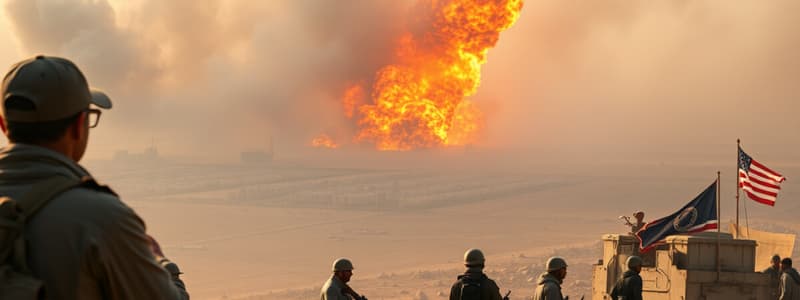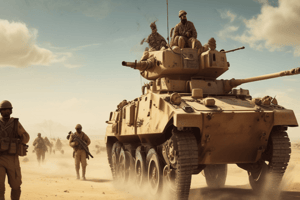Podcast
Questions and Answers
Why did Saudi Arabia fear an Iraqi invasion?
Why did Saudi Arabia fear an Iraqi invasion?
- Iraq invaded nearby Kuwait for its oil. (correct)
- Iran and Iraq were at war near the Saudi border.
- Iraq attacked ships in Saudi Arabian waters.
- Saudi Arabia was Kuwait's closest ally.
How did al-Qaeda get its start?
How did al-Qaeda get its start?
- As a force against Soviet invasion of Afghanistan (correct)
- As a terrorist group that attacked the United States
- As a Middle Eastern religious organization
- As a peace-seeking Islamic political party
What best characterizes Iraq and Afghanistan today?
What best characterizes Iraq and Afghanistan today?
- Both nations are experiencing periods of peace.
- Both nations struggle with unrest. (correct)
- Both nations are ruled by dictators.
- Both nations have stable governments.
Why was the US invasion of Iraq controversial?
Why was the US invasion of Iraq controversial?
Al-Qaeda's main targets on September 11, 2001, were:
Al-Qaeda's main targets on September 11, 2001, were:
The Taliban remained in power in Afghanistan until:
The Taliban remained in power in Afghanistan until:
The Department of Homeland Security was created to:
The Department of Homeland Security was created to:
Which statements about Saddam Hussein are accurate? (Select all that apply)
Which statements about Saddam Hussein are accurate? (Select all that apply)
By attacking the USS Cole, al-Qaeda ultimately aimed to:
By attacking the USS Cole, al-Qaeda ultimately aimed to:
As part of the war on terror, what action did the United States take in Afghanistan?
As part of the war on terror, what action did the United States take in Afghanistan?
Flashcards are hidden until you start studying
Study Notes
Saudi Arabia's Concerns
- Saudi Arabia feared Iraqi invasion due to Iraq's aggression towards Kuwait for its oil reserves.
- The Iran-Iraq War was a significant conflict near the Saudi border, escalating security concerns.
Formation of al-Qaeda
- Al-Qaeda originated as a response to the Soviet invasion of Afghanistan, serving as a collective resistance force.
Current State of Iraq and Afghanistan
- Both Iraq and Afghanistan currently face significant unrest and instability, far from having stable governments or peace.
Controversy of US Invasion of Iraq
- The US invasion was contentious as many people doubted Iraq's status as a valid terrorist threat, challenging the rationale for military action.
September 11 Attacks
- Al-Qaeda targeted New York City and Washington, DC, during the September 11, 2001 attacks, marking a pivotal moment in U.S. history.
Taliban's Rule in Afghanistan
- The Taliban maintained control over Afghanistan until their ousting in 2001, deeply impacting the region's political landscape.
Establishment of Department of Homeland Security
- The Department of Homeland Security was formed to safeguard the U.S. from terrorist attacks, emphasizing national security.
Saddam Hussein's Regime
- Saddam Hussein was recognized as a dictator who was ultimately overthrown and held responsible for various war crimes, including the invasion of Iran.
USS Cole Attack
- The attack on the USS Cole was intended by al-Qaeda to serve as a violent warning to the United States, showcasing their operational capacity.
US Actions in Afghanistan
- In the war on terror, the United States succeeded in driving the Taliban from power in Afghanistan, altering the political dynamics in the region.
Studying That Suits You
Use AI to generate personalized quizzes and flashcards to suit your learning preferences.




